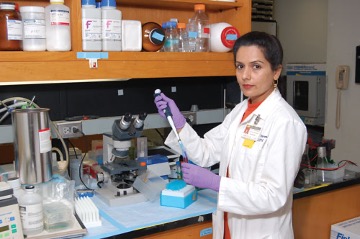16 May Nita Limdi on Mentorship, Genomic Research, and Race and Equity Issues in Precision Medicine [Podcast]

Dr. Nita Limdi is a Professor at the University of Alabama at Birmingham. She is a clinical pharmacist, epidemiologist, and renowned researcher in pharmacogenomics and pharmacoepidemiology. Her research centers around the factors that influence drug responses, with a focus on anticoagulants and antiplatelets.
Dr. Limdi joined us for an episode of Precision Insights to talk about the power of mentorship, the way that genomic research is changing, and how race and issues of equity intersect with this important field. Continue reading for a summary of the episode, and listen to the podcast at the link below.
The Importance of Mentorship

In early 2001, the new and exciting field of pharmacogenomics was starting to emerge, and it appeared to be very promising. The combination of genomic knowledge and pharmacology uncovered insights about drug responses that had never been seen before. Dr. Limdi, who was working as a clinical pharmacist at the time, was interested in learning more. She attended the very first pharmacogenetic research network meeting on April 15th, 2001, in search of a mentor. At the meeting, she met , a key player in the field of pharmacogenetics in its early stages.
With the support of Dr. Flockhart, Dr. Limdi intended to write a grant about the genetic underpinnings of She hypothesized that the dermatologic toxicities were related to the HLA region and immune response. This topic was something that no one else had ever investigated before, and Dr. Limdi was hesitant to proceed. After proposing her ideas to Dr. Flockhart over a long phone call, the line went silent. The next thing that Dr. Flockhart said was “you should go for it”.
To Dr. Limdi, his supportive attitude and confidence in her ideas was what made Dr. Flockhart a true mentor. As she has progressed in her own career and served as a mentor to aspiring researchers, Dr. Limdi has curated a list of important things to keep in mind when searching for an effective mentor.
- Mentees must have a clear understanding of what they want to accomplish. The clearer they can articulate their thoughts and ideas, the better that they can be helped and supported by a mentor.
- Do not let geography be a barrier to working with a particular mentor. The pandemic has shown that we can easily adapt to remote working models. Mentorship can also be adapted to a virtual format.
- Reach out to experts in the field, it may surprise you how many people are willing to help.
The Evolution of Pharmacogenetic Research

Since the start of Dr. Limdi’s career, genomics research has changed tremendously. She recalls that it used to take up to three or four days to sequence a genome; now, around two decades later, this can be done in a way that is much faster and cost efficient.
Another change that Dr. Limdi has witnessed is within the framework of collaboration. Advances in technology and transitions in attitudes towards data sharing have allowed investigators to work together to solve problems, instead of on their own.
For pharmacogenetic research specifically, we are seeing advances in regard to enabling clinicians to use pharmacogenetic research data. Most clinicians are not trained to use this type of data in clinical care, however organizations such as the Clinical Pharmacogenetic Implementation Consortium (CPIC) and Pharmacogenomics Global Research Network (PGRN) are addressing these knowledge gaps. Additionally, Standardizing Laboratory Practices in Pharmacogenomics (STRIPE) is a community that brings together various stakeholders to work together to further advance pharmacogenetics.
The Role of Race and Genomics in Medication Response

Medication responses vary across racial groups because of gene variants that are unique to each group. However, racial diversity is not always represented in clinical trials. Within existing , an anticoagulant medication, most participants were of European descent. Common variants were found across the participant group, but these findings could not be extrapolated to other racial groups.
Dr. Limdi was the first to assess the commonality of gene variants in different self-identified race groups. She uses the analogy of shopping for a dress to describe precision medicine. When buying a dress, you need to see if it fits Person X. Then, consider if it fits Person Y. If not, the dress needs to be tailored so that it does fit Person Y. The same goes for patient treatment; treatment needs to be tailored to suit each patient.
Clearly, studying diverse race groups is important and necessary to ensure that patients across all racial groups receive equitable treatment. Over recent years, social movements such as Black Lives Matter and Asian Lives Matter have initiated more conversations around equity and racism. Dr. Limdi says that we need to acknowledge our history and how ideas related to race have changed over time. It is our collective responsibility to reexamine and refine our ideas of race and ancestry. It is necessary to recognize the importance of race as a variable, to ensure that disadvantaged and underrepresented populations can also experience the benefits of genomic medicine.
Conclusion
Thank you to Dr. Nita Limdi for joining us for this podcast episode. Starting a discussion surrounding the intersection between race and equity issues and is an important step forward in improving overall patient health and safety. GenXys is a strong advocate for creating a more inclusive and safe healthcare environment for patients across all racial and ethnic backgrounds. We are excited to see Dr. Limdi continue her research and push for an equitable future in healthcare.

About Precision Insights Podcast
The Precision Insights podcast is a podcast series consisting of inspiring conversations around precision medicine with industry thought leaders and innovators. Every two months (and sometimes more), we share the most cutting-edge technologies, processes, and initiatives in precision medicine. If you’re a patient, healthcare provider, healthcare executive, employer, or someone simply interested in precision healthcare, you’re sure to find something useful in each episode. We hope that you’ll join our listeners and start taking control of your health, or implement precision health into your workplace/health system as a result!
The Precision Insights Podcast is proudly made by the GenXys team. Feel free to get in touch with us, we would love to hear your feedback, ideas, or thoughts. Contact us at info@genxys.com



Sorry, the comment form is closed at this time.